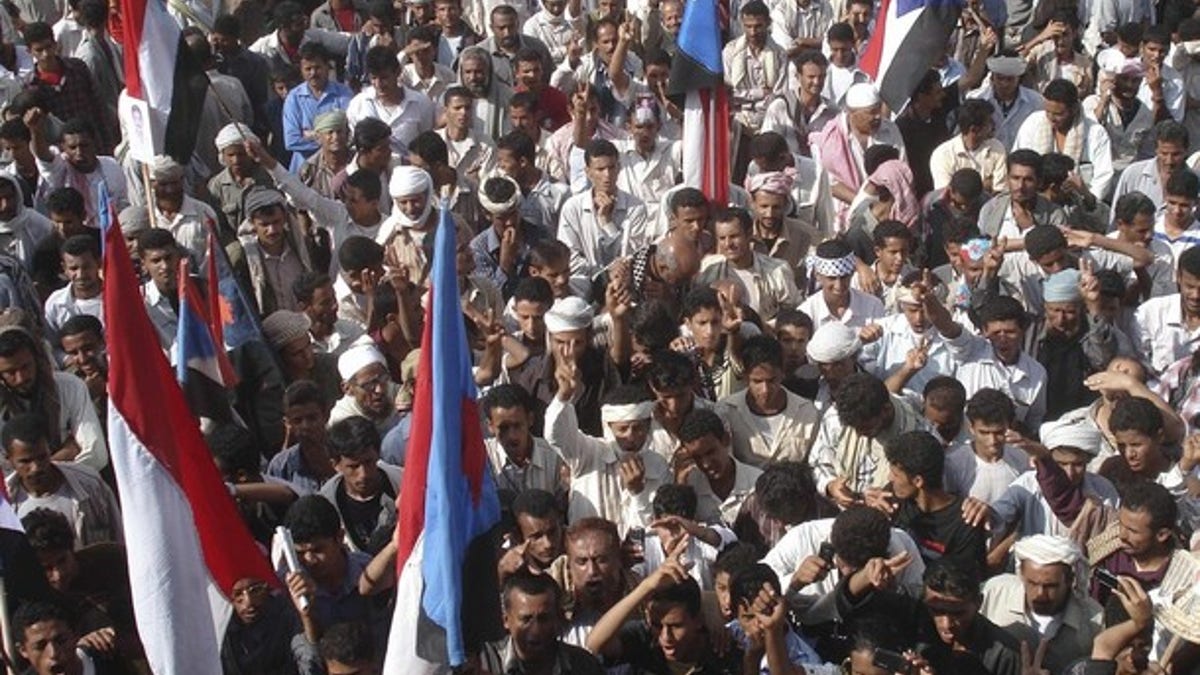
Dec. 17: Protesters wave flags of former South Yemen as they shout slogans during anti-government rallies organized by the Southern Movement to demand southern Yemen secede from the northern half (Reuters).
If terrorism follows the path of least resistance, then Yemen may be the poor man's Afghanistan.
With a stepped up presence of U.S. forces in Afghanistan, intelligence and security officials are now looking at other would-be hosts to Al Qaeda and its offshoot terrorist elements.
Near the top of that list is Yemen.
"Iraq was yesterday's war. Afghanistan is today's war. If we don't act preemptively, Yemen will be tomorrow's war. That's the danger we face," said independent Sen. Joe Lieberman, head of the Senate Homeland Security and Government Affairs Committee.
"Yemen is a hot spot. We need to do everything we can to work with that government," added Rep. Peter Hoekstra, the top Republican on the House intelligence committee, who appeared with Lieberman on "Fox News Sunday."
The arrest of a Nigerian man accused of trying to blow up a transatlantic flight to the United States on Christmas Day has now led back to Yemen.
Sources told Fox News on Sunday that suspect Umar Farouk Abdul Mutallab, the son of a wealthy retired Nigerian banker and government minister, had spent time in Yemen in the past year.
A government report sent to law enforcement agencies on Sunday also referred to Abdul Mutallab's "extremist ties and possible involvement with Yemen-based extremists." However, federal officials have not determined that Mutallab obtained any explosives in Yemen.
Yemen has been a trouble spot for a long time. In 2000, the USS Cole was attacked in the Yemeni port of Aden. Seventeen U.S. sailors were killed. All the defendants connected to the Cole bombing were released by Yemeni authorities or broke out of Yemeni jails by May 2008.
While Yemen's President Ali Abdallah Saleh has been increasing counter-terrorism cooperation, tribes in rural areas have given refuge to Islamic extremists. More than 90,000 Somali refugees also are located in Yemen, which sits across from the Horn of Africa.
Nearly half of Yemen's population is under age 15, and fewer than half the people are literate.
Yemen was reunified in 1990 after being divided in two since the end of World War II. The southern portion was overrun by Marxists after the British abandoned its protectorate in 1967. The north was run by an Islamic theocracy until 1962.
Now, political parties are divided into Islamic reformist groups, socialists and a Ba'athist Party similar to Saddam Hussein's in Iraq, among others. The Muslim Brotherhood, a pan-Arab, Sunni group that wants to spread Islamic law to secular governments, is an influential pressure group.
"The Yemeni government now is facing three confrontations -- one with the south, one with Al Qaeda and one in the north" that is supported by the Iranians as part of its proxy war with the West and U.S. ally Saudi Arabia, said terrorism expert Walid Phares.
A terrorist from Yemen went into Saudi Arabia in August with the same PETN explosive alleged to have been on Mutallab, said Lieberman. That terrorist "blew himself up within a small distance from Prince Mohammed bin Nayef, who's their counterterrorism leader in Saudi Arabia, killed himself; fortunately, only slightly injured bin Nayef."
An air strike in southern Yemen last week killed about 30 operatives, including the head of Al Qaeda in the Arabian Peninsula. Originally thought also to have been killed in the attack was Imam Anwar Awlaki, a cleric connected to Fort Hood suspected shooter Malik Nidal Hasan. However, that is now unconfirmed.
Regardless, said Lieberman, investigators must find out whether Awlaki was also in contact with Mutallab.
"He reached out to Yemen. He broke ties with his family. We don't know for sure whether he contacted the radical sheik who's now in Yemen, Awlaki, but Awlaki has got to be a subject and a target of our interest," Lieberman said..
"He obviously had some kind of connections with Yemen. And we know there was an imam in Yemen who may have been the inspiration for the Ft. Hood attack," said Senate Minority Leader Mitch McConnell, speaking to ABC. "It's amazing to me that an individual like this, who was sending out so many signals, could end up getting on a plane going to the U.S."
Umaru Mutallab, the suspect's father, actually alerted the U.S. embassy in Nigeria about his son's increased radicalization months ago, though it's unknown how familiar Mutallab was with his son's actions. News site Allafrica.com reported that the elder Mutallab is married to an Arab of Yemeni-descent but could not confirm whether the elder's wife is the younger Mutallab's mother.
Lieberman said he visited Yemen in August and found the Saleh government was "working well" with U.S. Special Operations, the Green Berets and intelligence to root out terror groups. White House Press Secretary Robert Gibbs said Sunday President Obama is directing U.S. resources where they need to be in the fight against terror.
"We're drawing down in Iraq, and focusing our resources on Afghanistan and Pakistan, the places in the world where attacks have previously been planned, and where this planning goes on now. We've strengthened our partnerships and cooperation with a number of countries, including Yemen, Somalia and Pakistan, as I mentioned before, and used all elements of our American power to seek to eliminate heads of Al Qaeda, and we've had great success in all three of those countries," Gibbs told ABC's "This Week" on Sunday.
Obama has said he wants to close the detainee facility at Guantanamo Bay, Cuba, and repatriate prisoners to their home countries, leaving all but the most infamous to trial in the United States. About 90 Yemenis remain at Guantanamo Bay and opponents of closing the prison say that facility should remain open.
"They should stay there. They should not go back to Yemen," Hoekstra said. "If they go back to Yemen, we will very soon find them back on the battlefield going after Americans and other western interests."
But sending any Yemenis to Thomson prison in Illinois, where the federal government is planning on housing detainees to be tried in the U.S., could be complicated by the Christmas Day attack.
"This whole thing should remind us ... that the soft talk about engagement, closing Gitmo -- these
things are not going to appease the terrorists. They're going to keep coming after us," said Sen. Jim DeMint, R-S.C.
Fox News' Catherine Herridge and FoxNews.com's Sharon Kehnemui contributed to this report.




